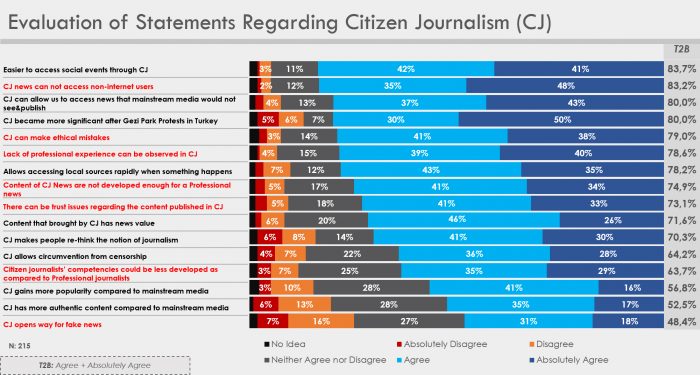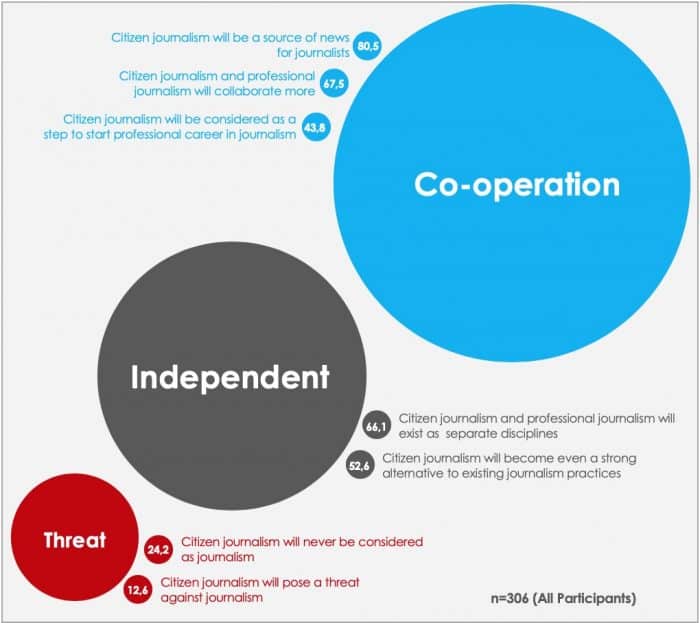A recent survey of Turkish professional journalists’ attitudes towards citizen journalism finds that while many value the work of citizen journalists, some have reservations over collaborating with them.

The Gezi Park protests became a focal point for opposition to the Turkish government, which responded by cracking down hard on all dissenting voices.
The current state of journalism in Turkey is mainly characterised by the steady deterioration of freedom of expression in the country over the last decade. This is manifested in the ever-increasing state capture of both mainstream and alternative media outlets, aided and abetted by the owners of pro-government conglomerates such as the Demirören, Turkuvaz, Dogus and Ciner media groups.
Alternative voices have been further weakened by the wholesale imprisonment of journalists and restrictions on internet freedom. Events such as the Gezi Park protests of 2013 and the coup attempt of 2016 were used by the AKP-dominated government of President Recep Tayyip Erdoğan as pretexts to “justify” the increased suppression of the opposition and a crackdown on independent media.
These conditions reduced the space in which alternative and opposition media outlets could operate, so that they are now few in number and have been forced to develop along non-traditional lines. Professional journalists who lost their jobs in the mainstream media have set up new online news operations, and many citizens who were inspired to take part in protest movements also became involved in launching new media outlets.
In the past, professional journalists rarely volunteered their views on the development of citizen journalism in Turkey, which is why we decided to conduct a quantitative survey involving 306 professional journalists – to gain a better understanding of the relationship between citizen journalism and professional journalism, and to find out how professional journalists perceive citizen journalists.
The journalists who took part in the survey work in both mainstream and alternative media, are engaged in all news formats, and include both journalists producing the news and news managers. Such quantitative surveys are rare in studies of citizen journalism, and we hope that the results obtained will make a useful contribution to the ongoing debate between media academics and practising journalists in this field.
An uneasy relationship?
The resulting report, Citizen Journalism: A Dilemma for Professional Journalists, focuses on areas of the news industry where there is the potential for interaction between professional journalists and citizen journalists, such as news production and the use of technology and social media. It also looks at the impact that the state of emergency imposed in July 2016 had on the production and sharing of news. Finally, it summarises the views of professional journalists on citizen journalism.

An overwhelming majority of professional journalists agree with the statement that citizen journalists facilitate access to “social events”.
Key findings
- Professional journalists in Turkey find it difficult to break away from a rigid conception of what constitutes an “ideal” form of journalism (defined as being objective and unbiased) – an ideal that is practically impossible to achieve under the currently prevailing conditions. They are also hidebound by the working practices imposed by the managers of media outlets. This is especially the case with journalists who work in the mainstream media (mainly owned by the pro-government conglomerate), less so with journalists who work for alternative/opposition media platforms.
- Many professional journalists tend to ignore the “activism-focused”, “rights-focused” or “local” aspects of citizen journalism. They prefer to define citizen journalism more as a source of raw material for their own work than as something that could inspire a different approach towards the practice of journalism.
- When asked to evaluate the different aspects of citizen journalism, professional journalists tend to emphasise citizen journalism’s potential as a source of new kinds of material, while at the same time warning that the use of this material is not without risk, as it is not always easy to see how it should be treated in the light of professional journalistic codes.
- Professional journalists tend to see citizen journalism mainly as a way of accessing information about civil society initiatives which is ignored by the mainstream media.
- However, they feel that content provided by ordinary citizens is still in a raw state and needs further polishing before it can be published. Many professional journalists regard citizen journalists as inexperienced and lacking in journalistic skills. Half of the journalists surveyed expressed the concern that if citizen journalism becomes more widely established and accepted, it could facilitate the spread of disinformation.
How might the relationship develop?

Professional journalists’ views on citizen journalism fall into three main categories.
Three main themes emerged in response to a question in the survey on how professional journalists saw their relationship with citizen journalists developing in future.
Co-operation: The most common response was to see citizen journalism as part of current professional journalism practice, either “in the form of cooperation with it or as an extension of it”. According to this perspective, “citizens will continue to supply conventional media platforms with necessary information and data to support professional journalists and it will be professional journalists who ultimately curate and publish the news.”
Independence: The second tendency sees citizen journalism as independent from professional journalism and assumes that citizen journalism will continue to develop its own practices and definitions. The challenges of working in mainstream media lead many Turkish professional journalists to see citizen journalism as a viable alternative to conventional journalism and potentially as a way of overcoming these difficulties.
Threat: The third tendency among professional journalists is to believe that “citizen journalism practices cannot be considered as journalism and it poses a threat to professional journalism”. However, the number of professional journalists who see citizen journalism as representing a threat to the future of their profession is quite small.
Citizen Journalism: A Dilemma for Professional Journalists summarises the results of a research project carried out with the help of funding from the Guardian Foundation and the Norwegian social sciences association Samfunnsviterne. The project director was Yunus Erduran, who co-authored the report together with Bora Ataman and Barış Çoban, both of whom are based at the Department of Communication Sciences of Doğuş University, Istanbul.
Opinions expressed here are those of the authors alone and do not necessarily reflect or represent the views, policies or positions of the EJO.
Top image: Istanbul Resist #5 by Murat Livaneli, Flickr/CC BY 2.0
If you liked this story, you may also be interested in Citizen Journalist or Citizen Witness?
Sign up for the EJO’s regular monthly newsletter or follow us on Facebook and Twitter.
Tags: activism-focused journalism, Censorship, Citizen journalism, Freedom of Expression, Internet Freedom, Social media, state capture













































